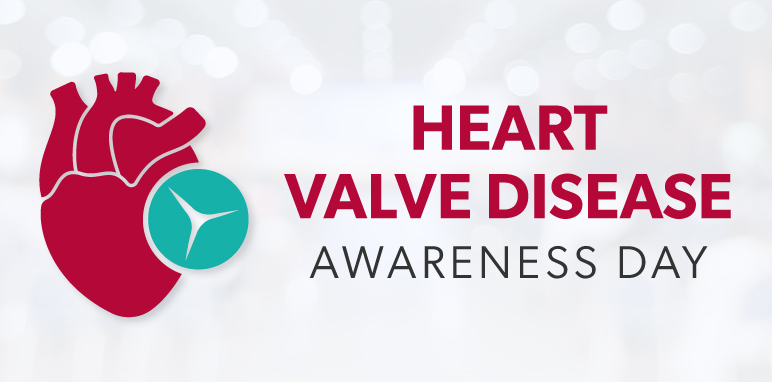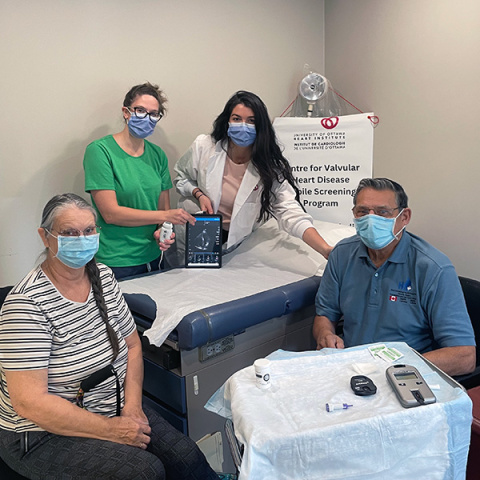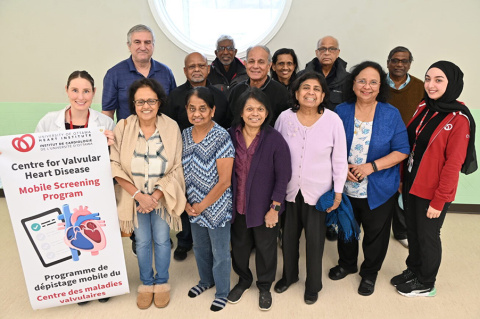
Despite continuous improvements in diagnosis, evaluation, and treatment of valvular heart disease, cardiologists believe it represents the next epidemic of cardiovascular disease.
Dr. David Messika-Zeitoun is a cardiologist and the director of the Centre for Valvular Heart Disease (CVHD) at the University of Ottawa Heart Institute (UOHI). He said heart valve disease is all too common, affecting nearly 25% of patients admitted to hospital for cardiovascular reasons.
“Valvular heart disease is unfortunately very common, and it has been overlooked in the past,” said Dr. Messika-Zeitoun. “About ten percent of people above the age of 75-years-old have some degree of valvular heart disease.”
What is valvular heart disease?
Valvular heart disease affects the function of one or more of the four valves in the heart. Each valve is equipped with a set of leaflets that open and close like a door. The leaflets are responsible for making sure blood flows correctly through the heart and to the rest of the body. Any disruption to the blood flow can cause problems for the heart, making it more difficult to pump enough blood to vital organs and tissues.
If left untreated, heart valve disease can lead to other heart problems, including arrhythmias, stroke, pulmonary hypertension, or heart failure.
Who is at risk?
While valvular heart disease can occur in people of all ages, there are certain risk factors that can increase the risk of developing the condition. These include:
- Age: Valvular heart disease is more common in older adults.
- Family history: If there is a family history of valvular heart disease, it can increase the risk of developing the condition.
- Congenital heart defects: People with congenital heart defects may have an increased risk of developing valvular heart disease.
- Other heart conditions: People with certain heart conditions, such as cardiomyopathy or coronary artery disease, may also be at a higher risk of developing valvular heart disease.
What are the symptoms of valvular heart disease?
The symptoms associated with valvular heart disease can vary depending on the severity of the condition (often, individuals experience no symptoms until the progression of the disease becomes severe). The most common symptoms include shortness of breath, chest pain, dizziness, fatigue, swelling in the legs, ankles or abdomen, or irregular heartbeats.
Many of these symptoms can be confused with less serious conditions, the effects of aging or physical inactivity. The severity of symptoms does not always correlate with the severity of the heart valve disease. Some people with mild symptoms may need treatment immediately to prevent further heart damage.
The problem is exacerbated by late detection and undertreatment, which often leads to increased risk of complications and mortality, said Messika-Zeitoun.
“Heart valve diseases are progressive diseases and often remain silent for years,” he said. “Too often we are finding patients with valvular heart disease late in the progression of the disease.”
Fortunately, heart valve diseases are largely curable. The CVHD and UOHI are investing in research to develop treatment to slow down progression of valvular heart disease and emphasizing routine screening to increase early detection.
Heart Valve Disease Awareness Day
February 22 is Heart Valve Disease Awareness Day, an international campaign established by the Alliance for Aging Research in 2017 as an annual day dedicated to raising awareness about heart valve disease—its risk factors, symptoms, detection, and treatment.
The Alliance is joined every February 22 (during February is Heart Month) by more than 115 organizations—patient advocacy groups, professional societies, heart and vascular institutes, hospitals and health systems, and partners like Heart Valve Voice Canada and the Canadian Cardiovascular Society.
Campaign allies are hoping to improve awareness, early detection, diagnosis, and timely treatment of heart valve disease by educating people on the importance of stethoscope checks, especially for those ages 60-plus.
At the University of Ottawa Heart Institute, the Centre for Valvular Heart Disease will host a one-day educational event for people to learn about the condition. The CVHD Mobile Screening Program will offer free heart valve screening and cardiovascular risk factor checks all day long.
Free mobile screening for valvular heart disease
“Heart valve problems are often undetected, and late detection may have severe consequences,” said Katherine Kelemen, a registered nurse at the UOHI.
“Our mobile screening program offers early detection, diagnosis, and treatment,” she explained. “In just a 30- to 60-minute appointment, our program can test for early signs of heart valve disease, and we provide recommendations at the end of each visit. Importantly all examinations are reviewed by a cardiologist.”
Goals of the CVHD Mobile Screening Program are fourfold: To identify heart valve problems that would otherwise be found too late; To improve access to care for minority groups, Indigenous communities, and underserved populations; To address an unmet need to early diagnose and treat valvular heart disease; And to expedite access to specialized cardiologists and testing. The program has provided screenings to over 500 individuals in Ottawa and the surrounding area alone.
The screening involves a mini ultrasound of the heart, some questioning, measurements, and a rapid finger poke blood tests to evaluate cardiovascular risk factors.
Never miss a Beat
Want interesting stories like this delivered straight to your inbox as they happen? Subscribe to our mailing list.





